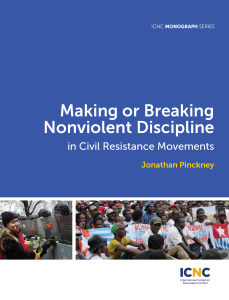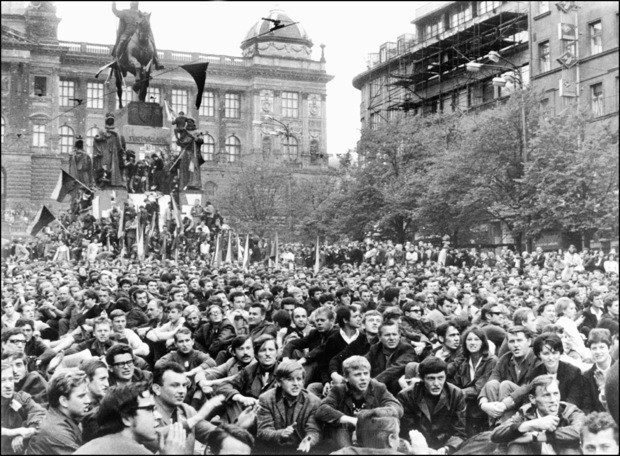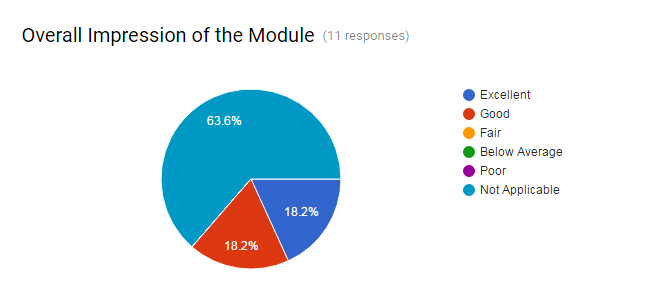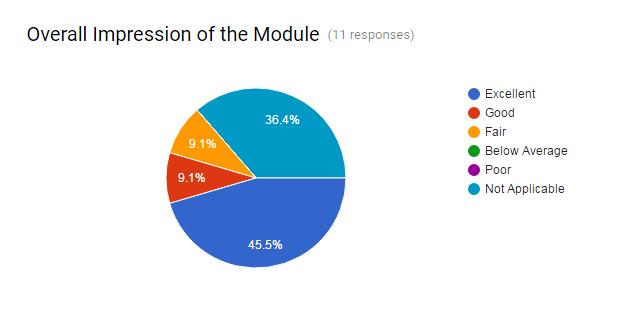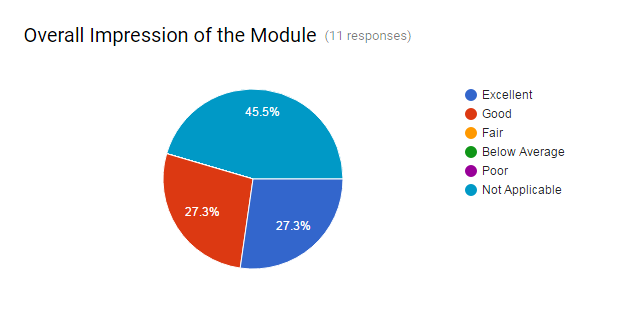Making or Breaking Nonviolent Discipline in Civil Resistance Movements
This Academic Webinar took place on Tuesday, January 17, 2017 at 12 p.m. EST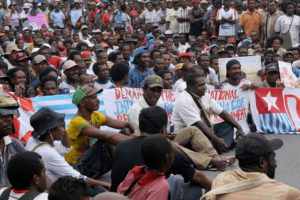
This webinar was presented by Jonathan Pinckney
Watch the webinar below:
Webinar content:
1. Introduction of the Speaker: 00:00-00:52
2. Presentation: 00:52- 29:20
3. Questions and Answers: 29:20-52:29
Two different polls were conducted among the participants during the webinar. The polls asked the following questions:
- In your opinion, how important is nonviolent discipline for the success of a civil resistance movement?
- In your view, what factors increase nonviolent discipline in civil resistance movements?
Check the webinar recording above to see the polls’ results that reflected the views’ of the webinar participants and compare them with the quantitative and qualitative findings of the research presented by the speaker.
Webinar summary:
How can we understand when nonviolent movements will stay nonviolent? When are they likely to break down into violence? In this monograph, Jonathan Pinckney analyzes both what promotes and undermines nonviolent discipline in civil resistance movements. Combining quantitative research on thousands of nonviolent and violent actions with a detailed comparison of three relevant case studies of civil resistance during the “Color Revolutions”, Pinckney’s analysis provides important lessons for activists and organizers on the front lines, as well as for practitioners whose work may impact the outcomes of nonviolent struggles. We learn how repression consistently induces violence, as do government concessions. On the flip side, we see that structuring a campaign in an inclusive and non-hierarchical way is conducive to greater nonviolent discipline.
Responses to questions not answered during the scheduled webinar time:
Participant comment/question: hanks for studying this topic. I’m in the US, and I’ve dealt with people who come to demonstrations and civil disobedience actions as participants in and advocates of “black bloc” style “diversity of tactics.” Many of the anti-corporate globalization mobilizations faced these challenges, and for a while even advocates of nonviolence seemed to try to split the difference with “black blocs.” But my perception is that this didn’t work (splitting the difference seemed to mean, in practice, rejecting what you call nonviolent discipline). And I think many advocates (the RANT collective, for example, I believe) reaffirmed advocacy for explicitly nonviolent agreements for demonstrations. I’m wondering, either in your case studies or your interest in the field, if you’ve studied the negotiation process between advocates and skeptics of explicitly nonviolent approaches.
Pinckney: This is definitely a major challenge for several movements, and it’s very typical to see back and forth struggles between groups who are committed to nonviolence and those who either explicitly espouse violence or at least want to keep their options open to a “diversity of tactics,” as you mention. I haven’t studied that negotiation process in depth, but I can tell that it’s certainly difficult. Some movements attempt to distance themselves from groups that don’t explicitly commit to nonviolence, others try to talk them into moderating or limiting their violent activities. It’s a process that’s very specific to the particular case, depending on what the power balance is between different groups, their connection to the larger social-political environment, etc.
Participant comment/question: I’m a little confused about your statistical tests, including the “statistical results” column. Were you testing these three cases alone, or bringing in other examples as well?
Pinckney: For my statistical testing I looked at around 18,000 actions by hundreds of different campaigns in 14 countries over a period of around twenty years. The countries were completely different than the three countries that I examined for the comparative cases section. That’s why you might have noticed that sometimes the findings were different for the statistical testing than for the three [in-depth] cases. I was particularly convinced by findings where I could see a pattern both in the statistical testing and in the three cases. I discuss where the data for the statistical testing comes from in great detail in my ICNC monograph.
Presenter

Jonathan Pinckney is a PhD candidate at the Josef Korbel School of International Studies, University of Denver, and a research fellow at the Sie Cheou-Kang Center for International Security and Diplomacy, where he supervises the Nonviolent and Violent Campaigns and Outcomes (NAVCO) 3.0 project. His research centers on nonviolent political contention in non-democracies, which special focus on the role of civil resistance in democratization. Jonathan’s work has been published in the Journal of Peace Research, Foreign Policy Magazine’s Democracy Lab, and the Encyclopedia of Social and Behavioral Sciences. Jonathan received his BA in International Affairs from Gordon College, graduating summa cum laude with special honors, and his MA from the Korbel School in 2014. He was a 2012 recipient of the Korbel School’s Sie Fellowship.
Making or Breaking Nonviolent Discipline in Civil Resistance Movements monograph
Recommended Readings:
- Hardy Merriman. “The Trifecta of Civil Resistance.”
- Liesel Mitchell. “Nonviolent Discipline: A Comparative Analysis of Tiananmen Square 1989 and Gwangju 1980.”
- Gene Sharp. “How Nonviolent Struggle Works.” (A shorter version of The Politics of Nonviolent Action that is available online) Chapter 11: Solidarity and Discipline to Fight Repression.
Upcoming ICNC webinars. For the full list of upcoming ICNC webinars go here.
Past ICNC webinars. Please visit the ICNC Webinar Digest to hear all ICNC webinars delivered between 2010-2016 in an easily accessible format.
National Nonviolent Defense Against Aggressor-States
This Academic Webinar took place on Wednesday, December 21, 2016 at 12 p.m. EST
This webinar was presented by Dr. Maciej Bartkowski
Watch the webinar below:
Webinar content:
1. Introduction of the Speaker: 00:00 – 00:55
2. Presentation: 00:56 – 49:52
3. Questions and Answers: 49:53 – 1:07:58
Four different polls were conducted among the participants during the webinar. The polls asked the following questions:
- What would you do if foreign troops invaded & occupied your town/city/region/country?
- In your view, how effective can nonviolent resistance against a powerful aggressor-state be?
- In your view, how effective can armed resistance against a powerful aggressor-state be?
- What resistance action would you join if your town/city/region/country was occupied by a brutal foreign regime?
Check the webinar recording above to see the polls’ results and compare them with the outcomes of the national surveys that were shown and discussed by the speaker.
Webinar Summary:
Historically, nonviolent resistance has proven to be more effective than armed insurrections against domestic authoritarian regimes. The relevance and applicability of civil resistance to fighting violent regimes at home are by now indisputable.
This scholarly, policy and practitioner confidence has yet to translate into the opinion that civil resistance can also be relevant and applicable for effective national defense against an aggressor-state. This webinar will elaborate on a national nonviolent defense as a viable means to counter external, overt and covert (hybrid) aggression and foreign occupation.
More specifically, the webinar will analyze the results of recent national surveys from Poland and Ukraine that show surprisingly large social capital among respective populations for civil resistance in case of violent foreign intrusion. It will also look at selected historical cases of nonviolent defense used spontaneously by the attacked societies and current efforts by Lithuania to integrate civil resistance into its defense policies and preparedness.
These analyses will show how nonviolent resistance strategies can be relevant for developing viable and effective national defenses against violent aggressor-states.
Presenter:
Dr. Maciej Bartkowski is the Senior Director for Education & Research at ICNC. At ICNC, Dr. Bartkowski manages academic programs for students, faculty, and educators that support curriculum-development, teaching, research, writing and study on civil resistance. He is editor of the ICNC Monograph series and the volume Recovering Nonviolent History: Civil Resistance in Liberation Struggles. He is also an adjunct faculty at Johns Hopkins University, Krieger School of Arts and Sciences and at Fletcher School of Law and Diplomacy. Read more
Relevant publications by Dr. Bartkowski:
- Countering Hybrid War. Civil Resistance as a National Defense Strategy, openDemocracy, May 2015. Available Online
- Nonviolent Civilian Defense to Counter Russian Hybrid Warfare, Critical Policy Issue Studies, Johns Hopkins University, March 2015. Available Online
- To Kill or Not to Kill: Ukrainians Opt for Nonviolent Civil Resistance, Political Violence @ A Glance, October 2015. Available Online
- The Kremlin’s “Protest Potential” Strategy, The HuffingtonPost, November 2016. Available Online
- Nonviolent Strategies to Defeat Totalitarians such as ISIS, openDemocracy, March 2016. Available Online
Brazil: Initiative seeks to create free labs for activists
Legacy of dissident movements could have lessons for today
Armenia: Female activists are reclaiming space in public life
Australian activists, dissenters, and whistleblowers feeling the heat
Sudanese opposition parties join call for civil disobedience
ICNC is Hiring
2014 ICNC Online Course: Civil Resistance and the Dynamics of Nonviolent Conflict
ICNC offered a moderated online course on civil resistance in partnership with the International Institute for Peace at Rutgers University Graduate School, which took place from October 14, 2014 to November 21, 2014.
Click on the following links to navigate: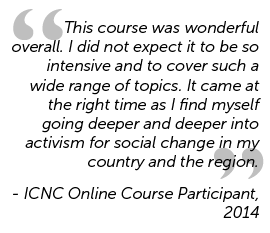
- Applications, admission and course participants
- Course moderation
- Course content
- Selected testimonials
- Useful tips from participants for course success
Applications, admission and course participants
ICNC received 86 applications and accepted 55 participants. Among those 55 participants, 23 countries of origin were represented including Israel, Pakistan, Venezuela, and Poland. The participant group was made up of activists, scholars, educators, and students.
Course facilitators included Dr. Maciej Bartkowski, Shaazka Beyerle, and Althea Middleton-Detzner.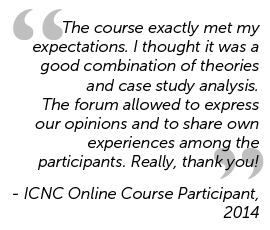
The online course consisted of an introduction module and five thematic modules. Each thematic module was released at the beginning of the week and the participants and moderators engaged in different forums of the module throughout the week. A detailed course outline is provided below. (Note: The selection of the ‘Not Applicable’ option indicates that the respondent did not participate in that particular module)
Module 1. Welcome and Introductions
Module 2. Foundation of Civil Resistance
- What civil resistance is, its dynamics, attributes, power of agency
- Explaining effectiveness of civil resistance: its record and why it was ignored in the past
Module 3. Deconstructing Misconceptions and Structural Determinism
- Common misconceptions and their harmful consequences
- Skills versus Conditions: underlying misconceptions, research findings (Freedom House study, Gaventa and Barrett), interplay between skills and conditions, Thomas Schelling quote
Module 4. Dynamics of Civil Resistance: Strategies and Tactics
- Nonviolent tactics and strategies (what they are/what is the difference between the two)
- Tools for tactical analysis
- Strategic sequencing of tactics (Nashville episode)
- Dilemma actions
- Backfire/paradox of oppression
- Defections
Module 5. Variety of topics [participants chose at least two out of six topics listed below]
- Nonviolent Resistance Against Violent Non-State Actors
- Gender Dynamics in Civil Resistance
- Violent Flank and Civil Resistance
- Unaccountable Exploitative Industry and Civil Resistance
- Grassroots Campaigns and Movements Impacting Corruption and Impunity
- Democratic Transition and Civil Resistance
5.1 Nonviolent Resistance Against Violent Non-State Actors:
If “Not Applicable” was selected it meant learners did not take part in reviewing and discussing this particular topic in Module 5, and instead chose a different one.
5.2 Gender Dynamics in Civil Resistance:
If “Not Applicable” was selected it meant learners did not take part in reviewing and discussing this particular topic in Module 5, and instead chose a different one.
5.3 Violent Flank and Civil Resistance:
If “Not Applicable” was selected it meant learners did not take part in reviewing and discussing this particular topic in Module 5, and instead chose a different one.
5.4 Unaccountable Exploitative Industry and Civil Resistance:
If “Not Applicable” was selected it meant learners did not take part in reviewing and discussing this particular topic in Module 5, and instead chose a different one.
5.5 Grassroots Campaigns and Movements Impacting Corruption and Impunity:
If “Not Applicable” was selected it meant learners did not take part in reviewing and discussing this particular topic in Module 5, and instead chose a different one.
5.6 Democratic Transition and Civil Resistance:
If “Not Applicable” was selected it meant learners did not take part in reviewing and discussing this particular topic in Module 5, and instead chose a different one.
Module 6
- Final Course Evaluations
“It was extremely knowledgeable and very concise and well organised in its structure. I could not have expected more…Very much impressed with the quality of lectures and course work and absolute brilliant administration and organisation by the ICNC Team.”
-ICNC Online Course Participant, 2014
“The course exactly met my expectations. I thought it was a good combination of theories and case study analysis. The forum allowed to express our opinions and to share own experiences among the participants. Really, thank you!!!”
-ICNC Online Course Participant, 2014
“This course was wonderful overall. I did not expect it to be intensive and to cover a wide range of topics. It came at the right time as I find myself going deeper and deeper in activism for social change in my country and region.”
-ICNC Online Course Participant, 2014
“My role models in nonviolence have been Mahatma Gandhi and Dr Martin Luther King both of whom advocated principled nonviolence yet were very strategic in the use of it. Without realizing it I had taken principled violence as the only form of violence and never considered those who use nonviolence for strategic purposes only. This understanding left me frustrated every time people turned away as I advocated for nonviolence. The course helped me get the message clearer and I will be able now to tell people correctly and draw more activists to adhere to our cause of nonviolent social change.”
-ICNC Online Course Participant, 2014
“I did not know the extent of women’s involvement in nonviolent movements. I knew it was substantial, but I had still underestimated just how powerful and effective women have been historically and presently in making nonviolence happen. Also, I was unaware of the number of instances in which folks used nonviolence, not because of an ideological commitment, but because it worked.”
-ICNC Online Course Participant, 2014
Useful tips from participants for course success
- Time management is key
- If you have internet access issues, plan work time efficiently
- Work a little everyday or pick certain days to dedicate large portions of time
- Explore the online course site in the beginning to understand all the tools
- Use your phone to read/work on the go
- Start discussions; ask questions
ICNC High School Curriculum Fellowships
 Interest in civil resistance movements and nonviolent action is rising among high school students. Whether driven by current events in their country, growing media attention that civil resistance movements are receiving, or other causes, opportunities need to be created for these students to follow their interest and pursue study of this field.
Interest in civil resistance movements and nonviolent action is rising among high school students. Whether driven by current events in their country, growing media attention that civil resistance movements are receiving, or other causes, opportunities need to be created for these students to follow their interest and pursue study of this field.
View the most recent call for High School Fellowships to learn more about the fellowship and requirements. A new call for applications is expected to be launched in the first quarter of every year.
Studying civil resistance movements and nonviolent action as an applied science and creative engagement can have numerous benefits for young students, including:
- Understanding new ways of engagement in making social, political, and economic change in their communities. This can lead to heightened engagement and a sense of empowerment.
- Preparing students for university-level study. There is a profusion of scholarly literature, and a growing number of courses on civil resistance offered at various universities in the areas of conflict, peace and security studies, political science, international relations, history, and sociology.
- Offering students general knowledge and skills that are relevant to future advanced studies in any of the broadly understood social sciences.
- For career-oriented students who know they want to pursue work in foreign policy, government, community organizing, journalism, advocacy, or civil society organizations, learning about civil resistance movements and nonviolent action can be a career-oriented learning opportunity. As this phenomenon increasingly shapes international affairs and domestic politics in countries around the world, government and civic actors are increasingly likely to encounter this phenomenon in their work. In such cases, knowledge about civil resistance movements is an important competency.
In Fall 2016, ICNC launched its first ever grant program for high school educators from around the world to support development and implementation of education on civil resistance movements and nonviolent action for high school students.
The first seven fellows of the program have been selected from the pool of excellent applicants who responded to the call. The fellows came from different parts of the world (Mauritania, Afghanistan, United States, South Africa, Hungary) and developed and thought civil resistance courses for the high school students in Winter, Spring and Summer of 2017.
View this year’s 2018 High School Curriculum Fellows:
View the final evaluations and learning assessments from the 2016 High School Curriculum Fellows:
- Ahmadullah Archiwal, High School Curriculum Fellow. Ahmadullah’s course evaluation & learning assessment
- Elizabeth “Betsy” Cepparulo, High School Curriculum Fellow. Betsy’s course evaluation & learning assessment
- Regina Feldman, High School Curriculum Fellow. Regina’s course evaluation & learning assessment
2015 ICNC Online Course: Civil Resistance and the Dynamics of Nonviolent Conflict
ICNC offered a moderated online course on civil resistance in partnership with the International Institute for Peace at Rutgers University Graduate School, which took place from October 9 to November 17, 2015.
Use the following links to navigate: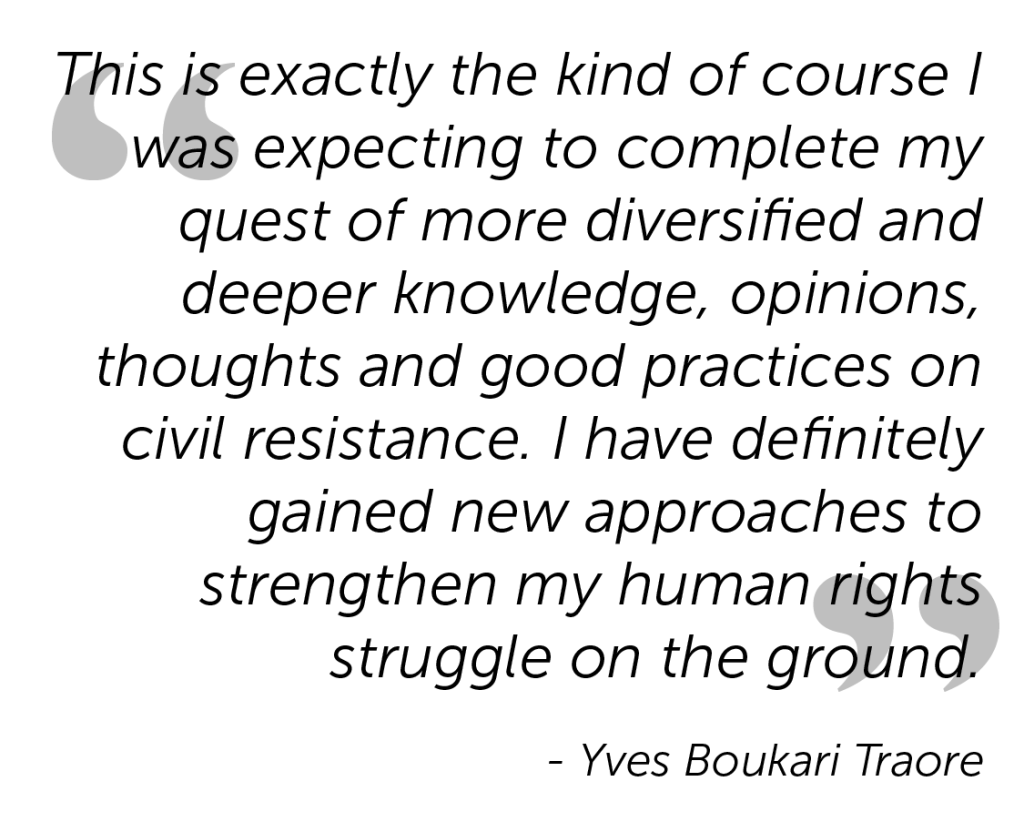
- Applications, admission and course participants
- Course moderation
- Course content
- Final evaluation results
- Selected testimonials
Applications, admission and course participants
ICNC received 142 applications and accepted 62 participants. The selected participants came from 26 countries, and included activists and organizers, international development and human rights professionals, journalists, educators, and students.
Six ICNC staff members moderated various discussion forums in the online course, adding significant value to the overall educational experience. The course moderators included: Dr. Maciej Bartkowski, Shaazka Beyerle, Althea Middleton-Detzner, Amber French, Katherine Hughes-Fraitekh. The course administrators were David Reinbold and Cathy Smith.
Check what participants thought about the course moderation.
In addition to the interventions in the discussion forums, course moderators provided weekly summaries from the forum discussions in a particular module, highlighting key points made, debates taking place and core information that was shared.
The online course consisted of an introduction and six thematic modules. Each thematic module was released at the beginning of the week and the participants and moderators would engage in different forums of the module throughout the week. A detailed course outline is provided below.
Check out what participants thought about the course content.
Module 1. Foundation of Civil Resistance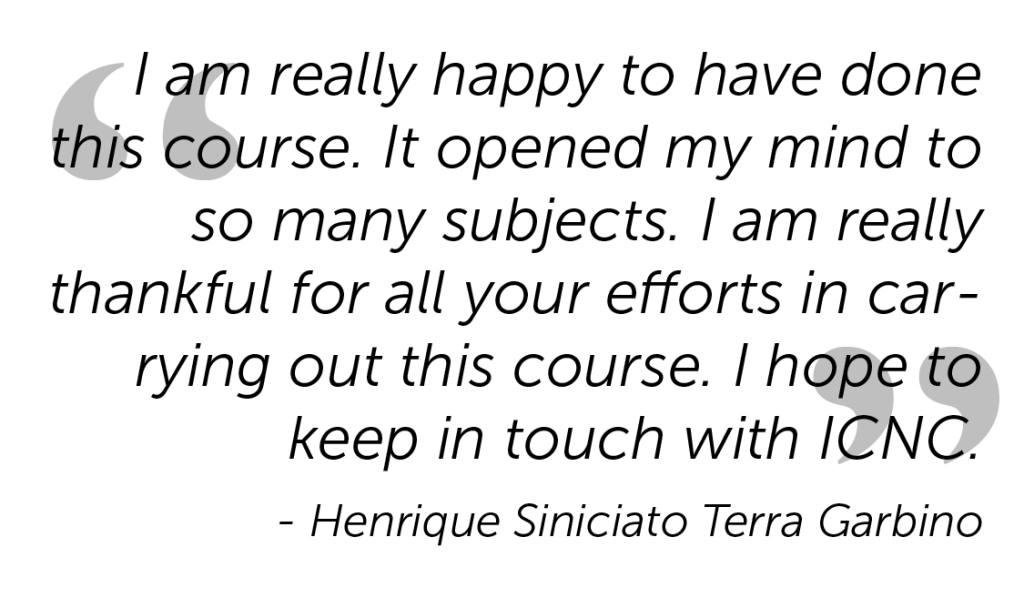
What Is Civil Resistance?
People and Power
Effectiveness of Civil Resistance
Module 2. Emergence of Civil Resistance, Conditions and Skills
Emergence of Civil Resistance Movements
Conditions and their Impact
Skills Drive Civil Resistance
Module 3. Strategies and Tactics of Civil Resistance
Nashville Lunch Counter Campaign (U.S. Civil Rights Movement)
Strategic Planning and Tactical Choices
Cultural Resistance Tactics
Tactical Innovation
Conflict Analysis Tools
Module 4. Repression and Backfire, Defections, Violent Flank
Repression and Backfire
Defections
Violent Flanks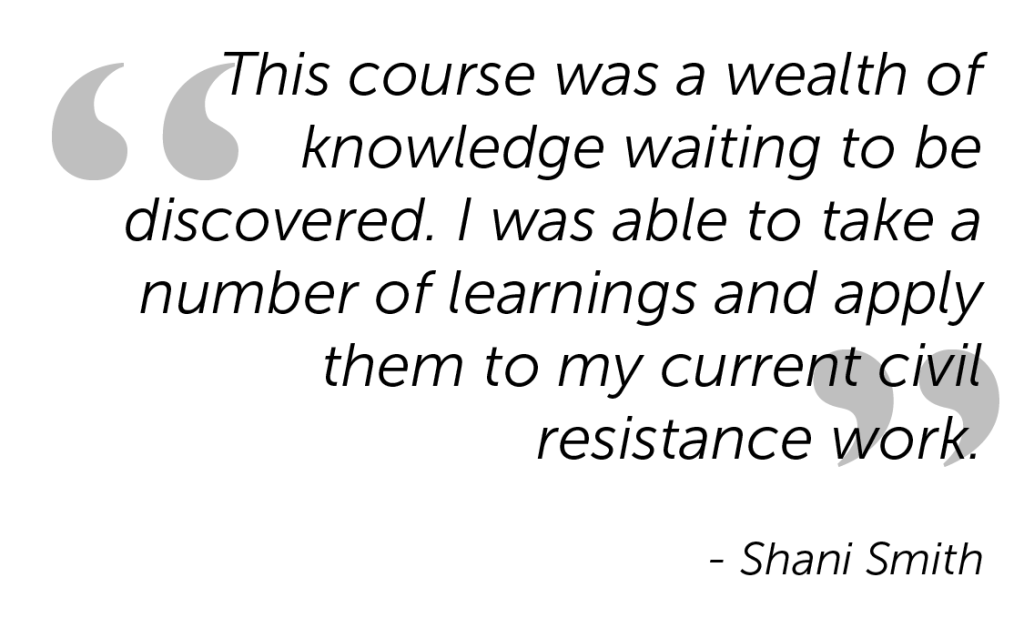
Module 5. Variety of Topics on Civil Resistance
People Power versus Corruption and Impunity
Civil Resistance in War-Torn Environments
Women and Nonviolent Resistance
Communication Strategies for Civil Resistance
Module 6. Variety of Topics of Civil Resistance
External Actors and Civil Resistance
Civil Resistance and New Technologies
Democratization and Civil Resistance
Civil Resistance and Corporate Governance
Included below are graphed responses to selected questions from the final course evaluation.
- Course content
- Knowledge gains
- Learning from other participants
- Quality of course moderation
- Meeting participants’ expectations
- Recommending the course
- Course relevance to work/study/activism
1. Course content was organized and planned
2. Course modules and content were timed and sequenced well
3. Course content was comprehensive, balanced and topics well selected
4. I now have more knowledge about civil resistance and its various topics than I had before taking the course
Learning from other participants
5. I learned about civil resistance from course participants
6. I learned about civil resistance from course moderators
7. Course moderators offered useful comments
8. I found module summaries shared by moderators relevant and helpful
Meeting participants’ expectations
9. Course met or exceeded my expectations
10. I would recommend this course to other people
Course relevance to future study/work/activism
11. I expect the knowledge from the course to be relevant in my future study/work
12. Where do you plan to apply the knowledge from this course?
“This course was a wealth of knowledge waiting to be discovered. I was able to take a number of learnings and apply them to my current civil resistance work.”
– Shani Smith, ICNC online course participant, 2015
“This is a great, rigorous course on civil resistance from start to finish, covering more ground than you imagine is possible!”
– Rivera Sun, ICNC online course participant, 2015
“I am really happy to have done this course. It opened my mind to so many subjects. Since I am in the military, [nonviolent conflict] may sound counterintuitive (even though by our own doctrine it should not), but now I will always think of the nonviolent option as probably the most effective one. I am really thankful for all your efforts in carrying out this course. I hope to keep in touch with ICNC.”
– Henrique Siniciato Terra Garbino, ICNC online course participant, 2015
“This is exactly the kind of course I was expecting to complete my quest of more diversified and deeper knowledge, opinions, thoughts and good practices ( from the other participants) on civil resistance. I have definitely gained new approaches to strengthen my human rights activist daily struggle on the ground.”
– Yves Boukari Traore, ICNC online course participant, 2015
“Thank all our Moderators and facilitators of their courage, professionalism and experience they demonstrated in making this a true learning process and experience in my life long career in Global Peace education. Thank you.”
– Kamara Ibrahim, ICNC online course participant, 2015
